Don't wanna be here? Send us removal request.
Text
Launch of the Cluster Munitions Monitor 2024 report.
Watch the United Nations Institute for Disarmament Research (UNIDIR) - Press Conference: Cluster Munitions Monitor 2024.
Speakers:
· Charles Bechara, ICBL-CMC Communications and Media Manager
· Mary Wareham, Cluster Munition Monitor 2024 Ban Policy Editor
· Katrin Atkins, Cluster Munition Monitor 2024 Impact Team Senior Researcher
· Loren Persi, Cluster Munition Monitor 2024 Impact Team Lead
Launch of the Cluster Munitions Monitor 2024 report

#United Nations Institute for Disarmament Research#press conference#UNIDIR#cluster munitions#UNOG#United nations office in Geneva
1 note
·
View note
Text
Country by country, community by community, let’s rid the world of these weapons, once and for all.

Landmines and explosive ordnance and remnants of war directly threaten millions of people caught up in armed conflicts around the world — from Afghanistan to Myanmar to Sudan to Ukraine to Colombia to Gaza.
Even after the fighting ends, these deadly devices can contaminate communities for decades to come, posing a daily and deadly danger to women, men and children alike, and blocking vital humanitarian and development assistance.
The brave mine action personnel of the United Nations work with partners to remove these deadly weapons, ensure that people can travel safely in their communities, and provide education and threat assessments to keep people and humanitarian workers safe.
This year’s theme — Protecting Lives, Building Peace — reminds us of the need to safeguard those at particular risk, including people living with disabilities.
I also call on Member States to support the United Nations Mine Action Strategy, and ratify and fully implement the Anti-Personnel Mine Ban Convention, the Convention on Cluster Munitions, and the Convention on Certain Conventional Weapons.
Country by country, community by community, let’s rid the world of these weapons, once and for all.
#clearinglandmines#protecting lives. building peace#explosivedevices#landmines#demining#commemorative events#4 april#united nations headquarters#united nations secretary general#statements#international day for mine awareness and assistance in mine action
1 note
·
View note
Text
Beyond Oslo - Taking stock of Gender and Diversity mainstreaming in the Anti-personnel mine ban convention.
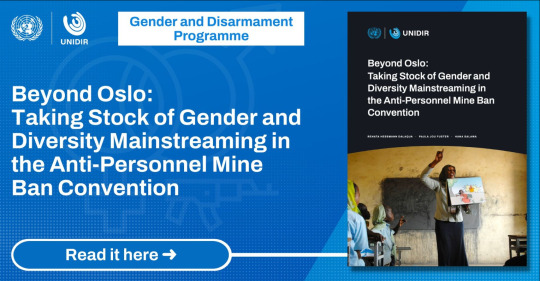
Considering improvements in gender & diversity mainstreaming within mine action?
Our "Beyond Oslo" report analyzes the effectiveness of current strategies & explores potential paths forward.
The Anti-Personnel Mine Ban Convention (APMBC) is a reference in gender and diversity mainstreaming. In its latest Action Plan, known as the Oslo Action Plan (OAP), APMBC States Parties committed to take a number of practical steps to integrate gender perspectives and the diverse needs and experiences of people in affected communities into all aspects of mine action and programming.
As the OAP enters its final year of implementation, this report provides an overview of the implementation of action points covering gender, diversity, and inclusion, with the intention to assess its impact and reflect on the way forward. Drawing on official reporting and statements made by States Parties, as well as on a survey conducted with key actors in mine action, this report outlines instances of progress achieved regarding gender and diversity mainstreaming, as well as challenges and areas for improvement that could be addressed in the next Action Plan.
Citation: Renata H. Dalaqua, Paula Jou Fuster and Hana Salama (2023) "Beyond Oslo: Taking Stock of Gender and Diversity Mainstreaming in the Anti-Personnel Mine Ban Convention", UNIDIR, Geneva.
#gender and diversity#anti personnel mines#mine ban convention#gender equality#imad2024#protecting lives. building peace#ProtectAndBuild#international day for mine awareness and assistance in mine action#4 april#UNIDIR#UN Institute for Disarmament Research
0 notes
Text
Strengthening Shared Understanding on the Impact of the ATT in Addressing Risks of Diversion in Arms Transfers: A Compendium of Key Resources and Tools.

During 2020–22, the Consortium produced three Issue Briefs and launched a new Counter-Diversion Assessment Tool. This body of research aims at contributing to tackling diversion risks associated with poorly regulated arms transfers at the national, regional and multilateral levels and at informing the development of good policies and practices within the framework of the ATT and other relevant instruments. The Compendium presents key recommendations, resources and tools from the 4 publications mentioned above. It aims at providing a light overview of this work and an introduction to some of its key themes and findings.
#Counter-Diversion Assessment Tool#arms transfers#Compendium#Arms Trade Treaty (ATT)#abandoned unexploded ordnance#explosive ordnances#unexploded ordnance#improvised explosive devices (ieds)
0 notes
Text
How do gender and diversity relate to mine action?
This #MineAwarenessDay, we release our new explainer, created together with the Geneva International Centre for Humanitarian Demining - GICHD. Learn the significance of embedding gender, age, and disability insights into Mine Action practices.
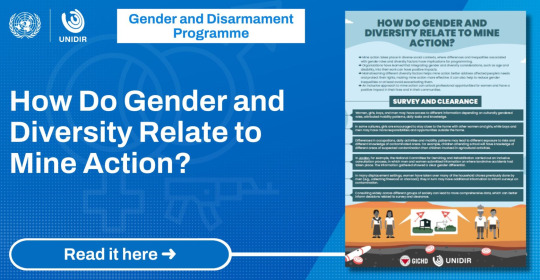
UNIDIR's Gender and Disarmament Programme and the Geneva International Centre for Humanitarian Demining (GICHD) have produced a short explainer on gender and diversity in the context of mine action. This resource explains the importance of integrating gender and diversity considerations, such as age and disability, into specific areas of mine action: Survey and Clearance; Explosive Ordnance Risk Education; Victim Assistance; and Employment. Based on examples from various regions, this resource demonstrates that gender and diversity mainstreaming can better address affected people’s needs and protect their rights, making mine action more effective.
Citation: United Nations Institute for Disarmament Research, and Geneva International Centre for Humanitarian Demining (2024). "How Do Gender and Diversity Relate to Mine Action?", UNIDIR, Geneva.
#international actors#international humanitarian law#international day for mine awareness and assistance in mine action#Gender and diversity#mine action#mineawarenessday#Geneva International Centre for Humanitarian Demining - GICHD#protecting lives. building peace
0 notes
Text
Enable states to assess and strengthen national capacities against improvised explosive devices.
Explosive hazards have profound effects on communities and development. The UNIDIR C-IED tool enables states to assess and strengthen national capacities against improvised explosive devices.Together, we can protect our communities and build peace.
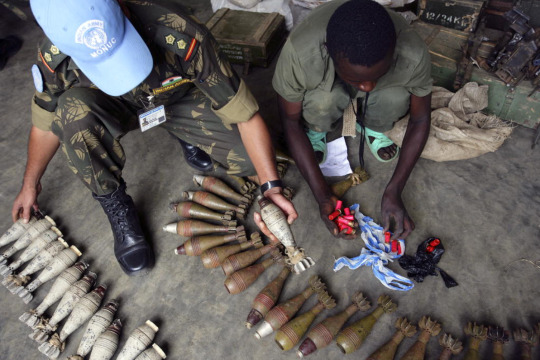
#UNIDIR C-IED#toolkit#improvised explosive devices (ieds)#explosive hazards#anti personnel mines#Protect And Build#imad2024#protecting lives. building peace#international day for mine awareness and assistance in mine action#MineAwarenessDay
2 notes
·
View notes
Text
SYRIA - Mine awareness through painting activity.
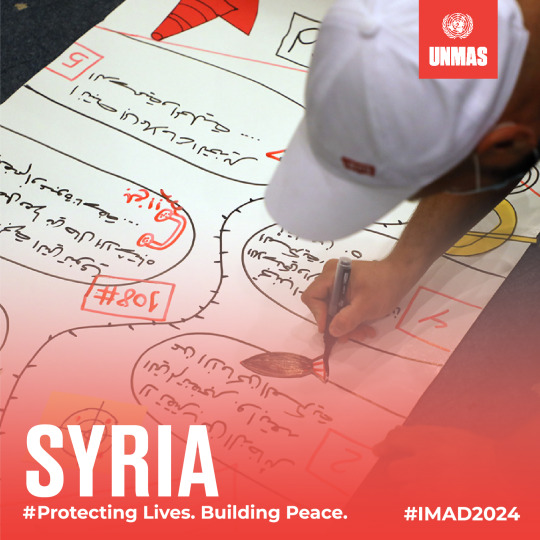
The UNMAS team in Syria invited heads of agencies in Syria for a field visit to Yarmouk on Thursday 14th March (Yarmouk is a Palestinian refugee camp and was heavily affected by the crisis). The joint visit by UNMAS ,UNRWA and Norwegian People’s Aid (NPA) survey and clearance teams took place then.The event has been arranged to mark Mine Action Day. In cooperation with agencies including UNHCR, UNFPA, UNICEF, UNRWA, WHO, OSE, and OCHA, a series of joint media posts will be published to mark the day and raise awareness of affected populations. Furthermore, a joint initiative with UNICEF was organized to promote mine awareness through painting activity in two schools located in Rural Damascus. There was also an SMS awareness campaign to all mobile phone subscribers in the country, and a Facebook campaign to ensure the messages and visual contents reach beneficiaries. Additionally, official ceremony will be held on 16 April, an open-door afternoon at the UNMAS office in Damascus allowing visitors to learn about the organization's demining operations in the country.
#united nations mine action service (unmas)#syria#commemorative events#unicef#unmas#campaign#4 april#protecting lives. building peace#international day for mine awareness and assistance in mine action#Norwegian People’s Aid (NPA)
0 notes
Text
SOUTH SUDAN - Launch of the National Mine Action Authority Law.
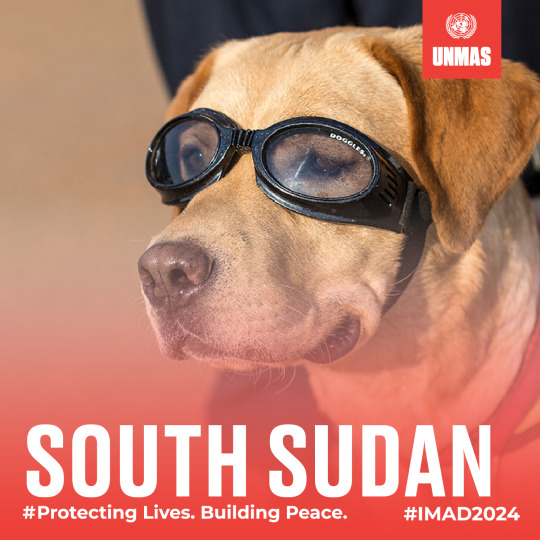
On 4 April, from 09:00 to 11:30 CAT, UNMAS South Sudan will lead a commemoration with a focus on youth, featuring a performance by a local musician and engagements with school students showcasing their molded art at Imperial Hotel, Juba. School children will present clay works along with an explosive ordnance risk education song produced by a local musician. Highlights will also include speeches by Honourable Angelina Teny, Minister of Interior Affairs; UNMISS, National Mine Action Authorities (NMMA), and mine action partners; as well as the launch of the National Mine Action Authority Law.
#mine risk education (mre)#explosive ordnance risk education#explosive remnants of war#National Mine Action Authorities (NMMA)#National Mine Action Authority Law.#commemorative events#south sudan#unmas#protecting lives. building peace#international day for mine awareness and assistance in mine action#4 april
1 note
·
View note
Text
DEMOCRATIC REPUBLIC OF CONGO -Commemorative event to raise awareness about the dangers of landmines and explosive remnants of war.

On 4 April, UNMAS RDC partner with the Korean International Cooperation Agency (KOICA) and the Congolese Mine Action Coordination Center (CCLAM) to organize an event in Kinshasa, in recognition of mine action day. The event brought together important people and organizations, including donors, embassies, national authorities, and others to raise awareness about the dangers of landmines and explosive remnants of war.
#Korean International Cooperation Agency (KOICA)#commemorative events#explosive remnants of war#unmas#Congolese Mine Action Coordination Center (CCLAM)#international day for mine awareness and assistance in mine action#4 april#protecting lives. building peace
0 notes
Text
ETHIOPIA - Focus on the support to victims affected by Explosive Ordnance.
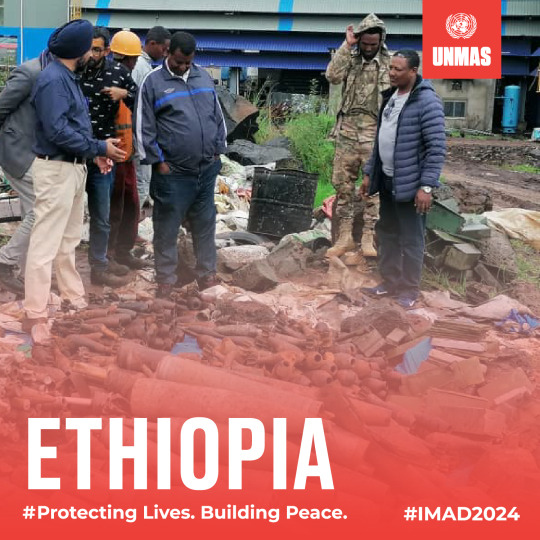
On 4 April, the United Nations in Ethiopia would like to stress the need for enhancing support to victims affected by Explosive Ordnance with a commemorative event in Addis Ababa, bringing together the United Nations, donors and members of the Mine Action community. Keynote speaker will be the director of the Ethiopian Mine Action Office, with further contributions by the UN Resident and Humanitarian Coordinator, the UNICEF Ethiopia Head and a representative of a local NGO involved in Mine Action in the country.
#explosive ordnance risk education#explosivedevices#improvised explosive devices (ieds)#imad2024#protecting lives. building peace#Ethiopian Mine Action Office#unicef#non governmental organizations#commemorative events#international day for mine awareness and assistance in mine action#4 april
0 notes
Text
COLOMBIA - Panel discussion titled "The Contributions of Mine Action to Peacebuilding in Colombia."
On 3 April, UNMAS Colombia will host the Forum and exhibition themed "Protecting Lives, Building Peace'' at the Pontificia Universidad Javeriana in Bogota, Jaime Hoyos Auditorium, to discuss "The Contributions of Mine Action to Peacebuilding in Colombia." This event will be accompanied by a thematic exhibition in which the organizations of Humanitarian Demining, Explosive Ordnance Risk Education and VA will present samples of the work they carry out in the communities, and will include an exhibition of the Museum of Improvised Prosthesis of the CIREC Foundation, pieces that have been collected from APM victims who have generated handmade prosthesis after their accidents. Participated in the social media campaign "Protecting Lives, Building Peace" (In Spanish) and was adopted by the 16 humanitarian organizations that make up the The Mine Action Area of Responsibility (MA AoR). Additionally, five UNMAS humanitarian coordinators present in the departments of Cauca, Córdoba, Chocó, Nariño and Valle del Cauca, have arranged with the regional governors to carry out activities aimed at landmine survivors. These local authorities will also disseminate the messages of the campaign agreed in the MA AoR.
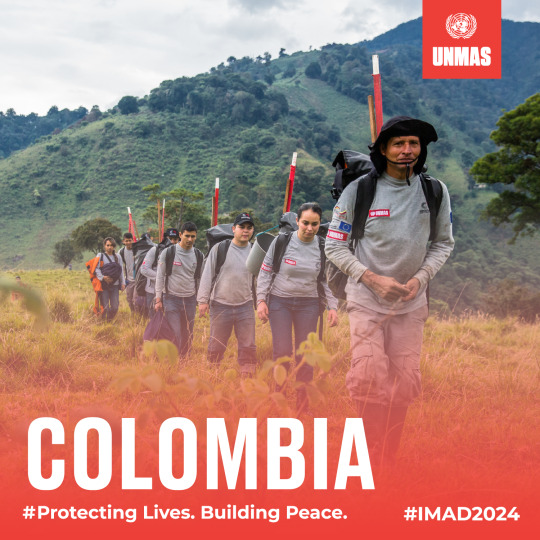
#mine risk education (mre)#explosive ordnance risk education#exhibits#demining#Museum of Improvised Prosthesis#CIREC Foundation#international day for mine awareness and assistance in mine action#imad2024#protecting lives. building peace#unmas#colombia#Mine Action Area of Responsibility (MA AoR)#peacebuilding
0 notes
Text
AFGHANISTAN - Around 100 deminers along with their technical equipment including (metal detectors, visors, and armor jackets) will be displayed/ paraded.
The IMAD commemorations in Afghanistan will be led by the Directorate for Mine Action Coordination (DMAC) and the mine action implementing partners on 4 April in Kabul. UNMAS Afghanistan and other key stakeholders will participate in the event. On the day around 100 deminers along with their technical equipment including (metal detectors, visors, and armor jackets) will be displayed/ paraded. There will also be an exhibition area for demining equipment, risk education and victim assistance.
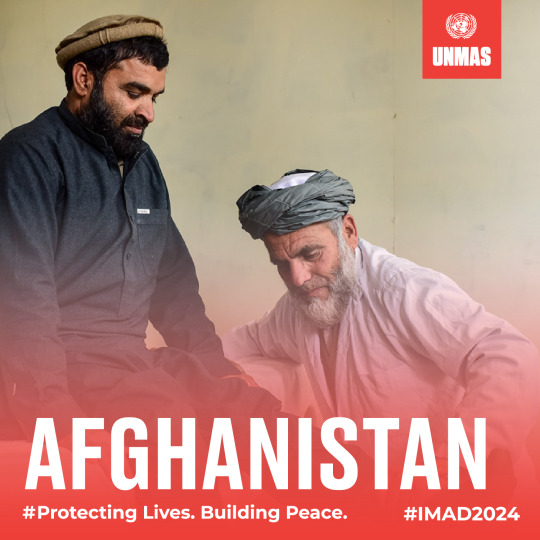
#afghanistan#international day for mine awareness and assistance in mine action#imad2024#protecting lives. building peace#exhibits#united nations mine action service (unmas)#Directorate for Mine Action Coordination (DMAC)
0 notes
Text
ABYEI - The UNISFA raises awareness about the dangers of explosive ordnance through the explosive ordnance risk education.
On 4 April in Abyei, UNISFA set up an interactive exhibition area about the "Prize Survey" and invited the staff to the "Show and Tell" event. They will be presenting a skit on explosive ordnance risk education to raise awareness about the dangers of explosive ordnance. Additionally, there will be live music and an award ceremony to recognize the most meaningful answers to the “Prize Survey”.

#Abyei#UNISFA#interactive exhibition#explosive ordnance risk education#Prize Survey#international day for mine awareness and assistance in mine action#unmas#protecting lives. building peace#imad2024
1 note
·
View note
Text
How mine-affected and post-conflict communities are working together with state parties around the world to bring about impactful and sustainable change.
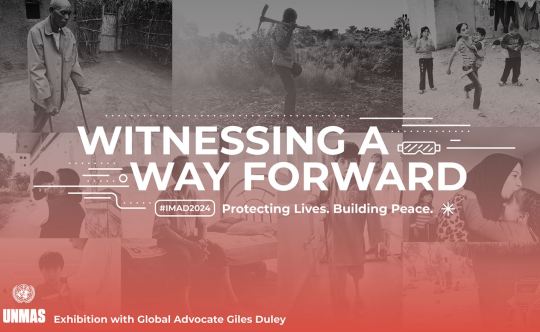
The "PROTECTING LIVES. BUIDING PEACE" exhibit invites visitors to hear from those directly involved in and affected by mine action around the world – and witness the way forward. It details how mine-affected and post-conflict communities are working together with state parties around the world to bring about impactful and sustainable change. This exhibit is organized and endorsed by United Nations Mine Action Service (UNMAS). It is in connection with the International Day for Mine Awareness and Assistance in Mine Action (4 April).
Physical and virtual exhibit coming 4 April 2024
#United Nations Mine Action Service (UNMAS)#exhibits#united nations exhibits#united nations visitor center#Witnessing a Way Forward.#International Day for Mine Awareness and Assistance in Mine Action
0 notes
Text
Marking the 25 Years of Global Efforts to Eradicate Landmines and Empower Lives.
Civil society urges vigilance against backsliding on the treaty’s norms.

Today marks the 25th anniversary of the Mine Ban Treaty's entry into force, a monumental milestone in global efforts to end the use of antipersonnel landmines, inherently indiscriminate weapons that have a devastating impact on communities worldwide.
Signed in December 1997, the treaty came into force on 1 March 1999, establishing a global prohibition on any use, production, stockpiling and transfer of antipersonnel landmines, as well as obligations to clear contaminated land and assist landmine victims. It was a groundbreaking achievement – the first time in history a conventional weapon was totally banned and victims’ rights to assistance recognized and included in a disarmament treaty.
Reflecting on the past 25 years, Ms. Tamar Gabelnick, Director of the International Campaign to Ban Landmines - Cluster Munition Coalition (ICBL-CMC) said: “Over the past 25 years, the ICBL has driven a transformative change in humanitarian disarmament. Our collective efforts have led to tangible and lasting changes for communities affected by mines – from the clearance of huge tracts of land to the recognition of rights of survivors. With tens of millions of stockpiled mines destroyed and near universal respect for the ban on use, the future risk to communities has also been curtailed."
Key Achievements
Today the convention enjoys widespread support with 164 countries formally onboard and with a strong stigma against the weapon established globally. Over the past 25 years the treaty has had remarkable impact, including:
-A substantial reduction in landmine casualties - down from some 25,000 casualties per year in 1999 to less than 5,000 casualties recorded last year by the Landmine Monitor; this means thousands of lives and limbs spared around the world;
Large tracts of contaminated land cleared and returned to productive use, with over 30 countries becoming mine-free;
-The almost universal end to use of a previously widely employed weapon
-Over 55 million mines held in stockpiles destroyed, with production and transfers almost nonexistent;
-The recognition of rights and needs of landmine victims, with efforts to provide assistance including medical care, rehabilitation, and psychosocial support and social and economic inclusion.
The Mine Ban Treaty has also inspired and served as a model for other international instruments, including the Convention on the Rights of Persons with Disabilities, the Convention on Cluster Munitions, the Treaty Prohibiting Nuclear Weapons, and most recently the Political Declaration on the Use of Explosive Weapons in Populated Areas.
Remaining Challenges
Despite these achievements, significant challenges persist. The conflict in Ukraine has created a new threat to the ban norm, with massive new contamination by Russia and reports of use by State Party Ukraine. Recent news reports also indicate that other European States Parties to the treaty fearing a threat from Russia are rethinking their commitment to the treaty despite their legal and moral obligations to the ban.
“Any movement by States Parties away from the norms of the treaty is unacceptable, would create a highly disturbing precedent, and would be an affront to the countless people who have lost lives and limbs to these hideous weapons. The reasons they were banned in the first place – their inherently indiscriminate nature, the horrific wounds they inflict, and the long-term threat they create for communities – hold equally true in times of conflict,” declared Ms. Gabelnick. “Any use of antipersonnel mines, by any actor, under any circumstances must be condemned in the strongest terms.”
Use has also been documented by Myanmar, as well as non-state armed groups in a handful of countries. New use has led to new contamination and a sharp rise in casualties. As reported by the latest Landmine Monitor over 85% of casualties recorded were civilians, and 50% were children. Dozens of countries still remain contaminated. In many clearance efforts have been slow, with contamination of improvised mines posing additional challenges. Many livelihoods are directly impacted and communities facing daily the threat of an accident. Risk education and victim assistance remain pressing challenges.
The needs of mine victims and survivors, who typically face permanent disabilities with profound impact on themselves and their families, are too often overlooked. Many struggle with access to assistance, services, and viable economic opportunities. The Landmine Monitor 2023 report underscores this concern, revealing that rehabilitation programs and support are critically underfunded, with international aid for victim assistance constituting only 5% of the total mine action funding.
The universalization of the convention has slowed down lately, with 33 states that are yet to join and no new member since 2017.
While celebrating the progress made over the past 25 years, the ICBL urges the global community to fortify efforts to fulfill the central goal of the treaty: “To put an end to the suffering and casualties caused by anti-personnel mines.” “We all need to continue with full determination to ensure further progress – stagnation or any backsliding are not an option, especially in these times of conflict and unrest. The treaty’s obligations to end all use of antipersonnel mines, clear all contaminated land, and empower all survivors must be respected without excuses, exceptions, or delays,” added Ms. Gabelnick.
ICBL’s call for redoubling of efforts comes ahead of the Siem Reap – Angkor Summit On A Mine-Free World - the Mine Ban Treaty’s milestone 5th Review Conference in Cambodia on 25-29 November 2024. States, the UN, and civil society, including mine survivors, will gather to asses the progress made to date and to provide a roadmap for the work ahead for the next five years, towards a future where no one lives in fear of landmines.
The International Campaign to Ban Landmines (ICBL) has played a pivotal role in the global movement to ban landmines, working hand in hand with governments, international organizations, and affected communities to create the treaty, expand its membership, and ensure its powerful provisions are put into practice by states. The ICBL has remained at the forefront of the efforts to see its promise fulfilled and put a conclusive end to the global scourge of landmines.
Ends
About the International Campaign to Ban Landmines (ICBL)
The ICBL is a global network of non-governmental organizations advocating for a world without antipersonnel landmines and where the suffering caused by these weapons has ended, and where the rights of victims are upheld and realized.The campaign was awarded the Nobel Peace Prize in 1997 for its efforts to bring about the Mine Ban Treaty.
#ICBL#non-governmental organizations#demining#clearinglandmines#landmines#antipersonnel landmines#international campaign to ban landmines
0 notes
Text
10th Session, 21st Meeting of State Parties to Mine Ban Convention.
Twenty-First Meeting of the States Parties to the Convention on the Prohibition of the Use, Stockpiling, Production and Transfer of Anti-Personnel Mines and on Their Destruction.
Description
12. Consideration of requests submitted under Article 5
13. Consideration of matters arising from/in the context of reports submitted under Article 7
14. Consideration of requests submitted under Article 8
Failing the establishment of a cooperative dialogue and the resolution of the current status of non-compliance through the submission of an extension request by Eritrea by 31 March 2023, the 20MSP mandated the President of the Twenty-First Meeting of the States Parties to seek clarification and resolve questions related to compliance by Eritrea through the Secretary-General of the United Nations in accordance with Article 8.2 of the Convention and to report back to the States Parties at their Twenty-First meeting.
The President will report back to the States Parties on the implementation of this decision.
15. Election of the President of the Fifth Review Conference of the States Parties and of the Twenty-Second Meeting of the States Parties
The Meeting will be asked to agree that H.E. Ly Thuch, Senior Minister and First Vice-President of the Cambodian Mine Action and Victim Assistance Authority (CMAA) be elected to preside over the Fifth Review Conference of the States Parties.
The Meeting will be asked to welcome the offer made by Japan to preside over the Twenty-Second Meeting of the States Parties.
The Meeting will be asked to welcome the offer made by Zambia to preside over the Twenty-Third Meeting of the States Parties.
16. Duration and matters pertaining to the preparations for the Fifth Review Conference and the Twenty-Second Meeting of the States Parties
The Meeting will be asked to agree that the Fifth Review Conference take place in Siem Reap, Cambodia from 25 to 29 November 2024.
The Meeting will be asked to agree that the First Preparatory Meeting in advance of the Fifth Review Conference take place on 20 June 2024 in Geneva and that the Second Preparatory Meeting in advance of the Fifth Review Conference take place on 18 September 2024 also in Geneva.
17. Any other business
18. Consideration and adoption of the final document
19. Closure of the Twenty-First Meeting of the States Parties
The Meeting will be asked to take decisions on the requests for extended mine clearance deadlines which will have been or may be submitted by Eritrea and Ukraine.Delegations will be given the opportunity take the floor on matters that have not been covered otherwise by the meeting.The Meeting will be asked to consider and adopt its final report.The meeting will be closed by the President.
#Mine Ban Convention#United Nations Office for Disarmament#UNODA#State parties#meeting#Anti-Personnel Mines#landmines#explosiveremnants
0 notes
Text
The year 2023 marks twenty-four years since the Anti-Personnel Landmine Convention came into force.

International Day for Mine Awareness and Assistance in Mine Action is held on 4 April every year. This year, the United Nations will mark this day under the theme “Mine Action Cannot Wait”. This year marks twenty-four years since the Anti-Personnel Landmine Convention came into force and while millions of landmines have been destroyed, 68 countries and territories globally still have an explosive remnant of war problem. Currently in BiH 865km2 remain mine suspected areas, constituting 1.7% of the country.
EUFOR Operation Althea input to Mine Awareness Day 2023
#Mine Action Cannot Wait#International Day for Mine Awareness and Assistance in Mine Action#4 April#explosive ordnances#anti personnel landmines
0 notes